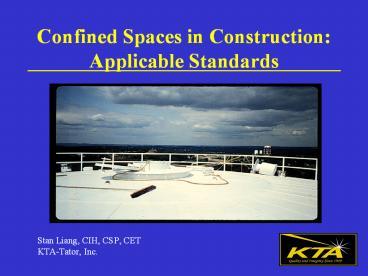Confined Spaces in Construction: Applicable Standards - PowerPoint PPT Presentation
Title:
Confined Spaces in Construction: Applicable Standards
Description:
Confined Spaces in Construction: Applicable Standards Stan Liang, CIH, CSP, CET KTA-Tator, Inc. Since the ultimate objective of any safety program should not be ... – PowerPoint PPT presentation
Number of Views:907
Avg rating:3.0/5.0
Title: Confined Spaces in Construction: Applicable Standards
1
Confined Spaces in Construction Applicable
Standards
Stan Liang, CIH, CSP, CET KTA-Tator, Inc.
2
Webinar Objectives
- Brief overview of the following
- OSHA Construction Standards
- Applicability of OSHA General Industry Standards
- Resources for additional information
3
Permit Required Confined Space Standard
- Industrial painting normally classified as
construction - OSHA may classify painting as maintenance on a
case by case basis - CPL 02-00-100Application of the Permit Required
Confined Spaces Standard - Maintenance work regulated under the General
Industry Standards making 29 CFR 1910.146
applicable
4
Permit Required Confined Space Standard
- Compliance can be required by
- Contract specifications
- Prime contractors safety program
5
Permit Required Confined Space Program
Requirements
- Hazard identification
- Hazard control
- Entry permit
- Specialized equipment
- Employee designation
6
Permit Required Confined Space Program
Requirements
- Testing and monitoring
- Outside contractors
- Emergency procedures
7
Construction Regulations
- Construction Standard requirements can be similar
to that found in the General Industry Permit
Required Confined Space Standard
8
Safety Training and Education 29 CFR 1926.21
- Defines confined spaces
- Has limited means of access and egress
- Subject to the accumulation of toxic or flammable
contaminants - Has an oxygen deficient atmosphere
9
Safety Training and Education29 CFR 1926.21
- Examples of confined spaces include
Storage tanks Process vessels
Underground utility vaults Tunnels
Pipelines Ventilation and exhaust ducts
Open top spaces (more than 4 feet deep)
10
Safety Training and Education29 CFR 1926.21
- Employees must be instructed in the following
- Nature of hazards
- Necessary precautions to be taken
- Use of protective and emergency equipment
11
Safety Training and Education29 CFR 1926.21
- OSHA does not provide specific guidance on
training requirements - General requirement for compliance with
applicable standards
12
Emergency Action Plans29 CFR 1926.35
- Plan must be in writing
- Response procedure in the event of a fire or
other emergency
13
Emergency Action PlanElements
- Emergency escape procedures and emergency escape
route assignments - Accounting for all employees after an evacuation
is completed - Rescue and medical duties for those employees who
are to perform them
14
Emergency Action PlanElements
- Means of reporting fires and other emergencies
- Contacts for further information
15
Medical Services and First Aid29 CFR 1926.50
- Provisions must be made prior to the start of the
project for prompt medical attention - The employer must ensure the availability of
medical personnel for advice and consultation
16
Medical Services and First Aid29 CFR 1926.50
- Where medical facilities are not reasonably
accessible, a person with a valid certificate in
first aid training shall be available on site - Reasonably accessible is defined as 3 to 4
minutes for life threatening emergencies
17
Medical Services and First Aid29 CFR 1926.50
- Materials in first aid kit approved by the
consulting physician - First aid contents must be in a sealed
weatherproof container
18
Medical Services and First Aid29 CFR 1926.50
- Checked prior to the start of the job and weekly
- Must be easily accessible
19
Medical Services and First Aid29 CFR 1926.50
- Proper equipment for prompt transportation or a
communication system for contacting ambulance
services - Telephone numbers of physicians, hospitals, or
ambulances must be posted
20
Respiratory Protection29 CFR 1926.103
- Use feasible engineering controls
- Respiratory hazard evaluations
- Respirator selection and rescue procedures for
IDLH atmospheres
21
Respiratory Protection29 CFR 1926.103
- Selected based on respiratory hazards to which
worker will be exposed - Reasonable estimate of employee exposures
- Estimate of contaminants physical and chemical
state
22
Respiratory Protection29 CFR 1910.103
- Oxygen levels must be determined
- Instrumentation required for determination
23
Respiratory Protection29 CFR 1926.103
- Hazard evaluations for toxic atmospheres
- Review safety data sheet
- Use personal sampling equipment or other
instruments to determine concentration - Consult a safety and health professional for
guidance
24
Respiratory Protection
- Confined spaces are classified as Immediately
Dangerous to Life and Health when - No hazard evaluation performed
- Atmospheric oxygen level is below 19.5
25
Respiratory Protection29 CFR 1926.103
26
Respiratory Protection29 CFR 1926.103
- Procedures for entry into IDLH atmospheres
- Communications
- Rescue team
- Notification of employer prior to start of
emergency entry for rescue
27
Fall Protection29 CFR 1926 Subpart M
- Employers relying on personal fall arrest systems
must have pre-planned rescue procedures
28
Fall Protection29 CFR 1926 Subpart M
- Criteria for prompt rescue in Suspension
Trauma/Orthostatic Intolerance OSHA information
bulletin
29
Summary
- Industrial painting projects likely to be
classified as construction - Elements of a confined space entry plan on
construction projects may be similar to 29 CFR
1910.146
30
Summary
- 29 CFR 1910.146 can apply to industrial painting
projects if - Work classified by OSHA as maintenance
- Compliance required by contract or controlling
employers written safety program
31
Additional Information
- www.osha.gov
- 29 CFR 1926 (Construction Industry Standards)
- 29 CFR 1910.146 (Permit Required Confined Space
Standards) - Letters of interpretation
- Suspension Trauma/Orthostatic Intolerance
Information Bulletin
32
Additional Information
- http//www.ansi.org (American National Standard
Institute) - ANSI/ASSE Z117.1 Safety Requirements for
Confined Spaces - http//www.cdc.gov/niosh (National Institute of
Occupational Safety and Health) - NIOSH Publication No. 87-113 A Guide to Safety
in Confined Spaces
33
Questions

